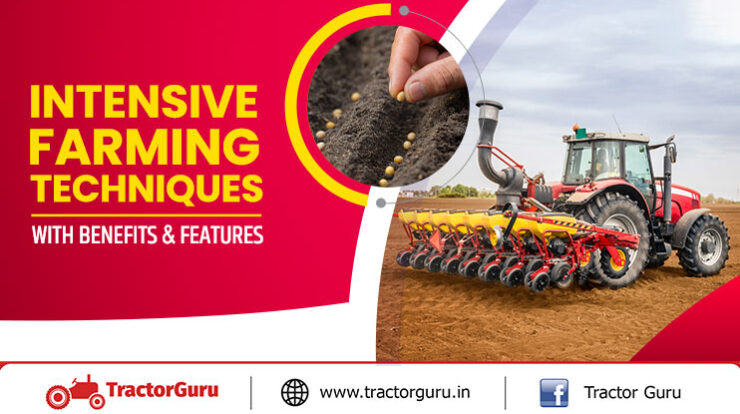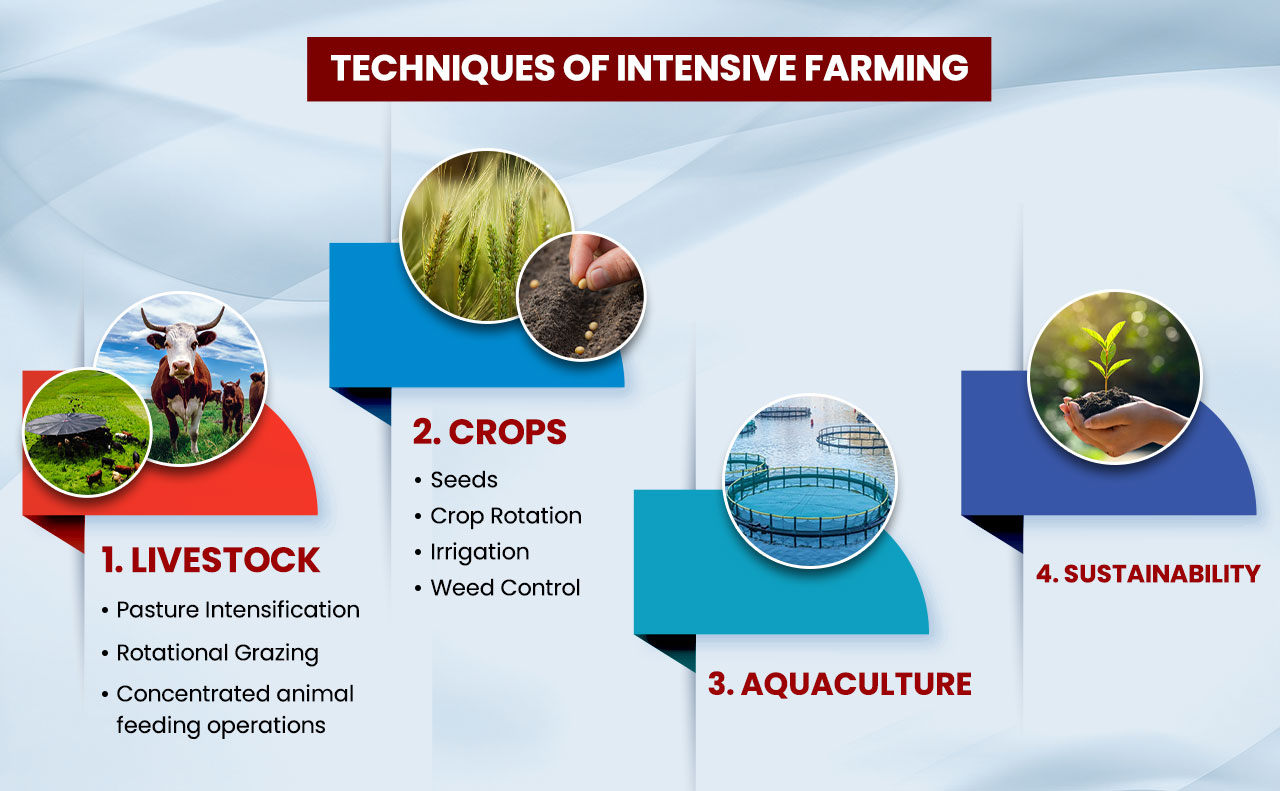Intensive Farming Techniques With Benefits And Features

Intensive farming is the practice where a high quantity of labour and capital are engaged to maximize agriculture production. But the question always arises in everyone’s mind: What is intensive farming? The answer is that it is labour-intensive agriculture whose main purpose is cultivation on a small tract with the help of manpower. To produce quality crops and maximum output, farmers use fertilizers, and pesticides to a great extent. With the help of an intensive production system, farmers enhance the soil and crop quality.
It is a method where a large number of crops are grown with intensive use of agrochemicals and other input strategies to achieve a higher output. This farming system is the latest farming technique that helps increase the higher production from a specific land.
Basically, it is characterized by the high use of fertilizers for crops, medication and concentrated feeding for the livestock. This method mainly raises the livestock and feeds them on small land and increases their productivity which is generally known as intensive livestock farming.
Intensive Farming Practices
A. Globally
Intensive agriculture meaning is basically achieving high production from per unit of land. Mainly intensive subsistence farming is practised in areas of globes such as Thailand, Korea, Japan, Indonesia, Taiwan and others. This farming is prominent in the high population density regions such as India, Bangladesh, China, Thailand etc.
B. In India
Indian farmers practise intensive wet paddy farming and intensive subsistence farming in India in many regions such as Kerala, Tamilnadu, West Bengal etc.
Intensive cropping agriculture registers a higher production per unit of the tract. For the best intensive agriculture examples, you can check the report of Japan, where the land available for farming is limited. Also, a similar kind of situation can be observed in Kerala, India.
Techniques of Intensive Farming

There are 4 techniques that consider the many technologies and types of intensive farming.
A. Livestock
The technique of intensive livestock production has many other technologies, including Pasture intensification, Rotational grazing and Concentrated animal feeding operations.
1. Pasture Intensification
Pasture intensification is a term for pasture soils and grasses to increase the food production potential of livestock systems. This process is characterized by loss of forage because of overgrazing, poor nutrient management and lack of soil conservation. These adverse effects lead to the degradation of pasture soils which can decrease the water availability, and fertility and may increase the acidification. Deteriorate pastures may significantly lower productivity.
2. Rotational Grazing
Rotational grazing is a type of pasture in which herds are regularly and systematically moved to fresh, resting grazing areas to increase the quality and quantity of forage growth. It can be used with cattle, sheep, goats, pigs, chickens, turkeys, ducks and other animals also. Herds graze one part of the pasture while allowing others to recover.
3. “Concentrated Animal Feeding Operations”, CAFO
Intensive livestock farming, or we can say factory farming is a kind of process where the livestock is raised in confinement at high density. The “Concentrated animal feeding operations” (CAFO), or “intensive livestock operations” department, can raise large numbers of livestock which can go up to hundreds or thousands, including intensive cow farming, turkeys, and hogs, intensive chicken farming etc. The motive of such kinds of farms is only the concentration of livestock in a given space. Aim of the CAFO is to provide higher output at low cost with the greatest level of food safety.
B. Crops
As we know, the green revolution transformed farming methods in many developing countries. It started many technologies and farming methods that already exist but have not been used extensively outside of the agriculture industry. However, even many average farmers are still unaware of such technologies. These technologies generally include “miracle seeds”, pesticides, irrigation, etc.
1. Seeds
That is, there is a need to buy seeds every season for annual crops, thereby increasing the cost and profit for the farmers.
2. Crop Rotation
Crop rotation is a method of practice of growing a series of different types of crops on the same land according to the seasons. The method of crop rotation also seeks to balance the demands of nutrients of different crops to avoid soil nutrient depletion. Crop rotation also helps to improve soil structure and fertility through alternative deep-rooted plants and shallow-rooted plants.
3. Irrigation
Although flood irrigation is the oldest and most prominent irrigation type in which a field receives excess water to deliver adequate quantities. But Crop irrigation mostly depends on the world’s 70% freshwater.
4. Weed control
Weed management is necessary before every farming and is oftenly performs by machines, by manpower (manually) and by spraying.
C. Aquaculture
Aquaculture is a part of the cultivation of natural species of water that includes intensive fish farming, algae, and other water organisms. But intensive aquaculture techniques are impements on the land using ponds, tanks, and other water-controlled systems.
D. Sustainability
Practices of intensive farming in India are sustainable, which is develop to stop degrading agricultural land and then regenerate soil health and ecosystem services also. These upgrades include the intensive and organic farming category, a combination of organic and traditional farming. It includes bio intensive farming, agroforestry, intercropping and vertical farming.
Features of Intensive Farming
This farming is very prominent in India and more preferable by the farmers because it includes some of the basic characteristics/features. Here are some popular features of intensive subsistence farming which make it more demanding.
- Needs smaller size land
- Maximize labour are engaging
- High crop production
- Low capital requires
- Climatic dependency is higher
- Emphasis on grains production
- Soil dependency is higher
- Focused on manual or animal farming
- Less modern technology
Pros of Intensive Farming
There are some good effects of intensive farming that directly emphasise on higher production by intensive animal agriculture or manually. The benefits of this farming consider some of the advantages which we have mentioned below.
1. High Crop Production
High production of crops is one of the main benefits of intensive farming. Because agricultural products are in high demand in the global food market, including meat, eggs, milk, fish, cereals and so on. This farming and crop production are basically executes on a small piece of land in higher quantities.
2. Produce More Food Varieties
It is mainly concentrates on bulk food production in a crop cultivation or livestock farming also. This process prompts more resources of nourishment for human utilization. This farming requires high manpower, resources and capital, which makes it more focused on production area and quantity also.
Accordingly, the different farming in different areas by different farmers are engage in intensive poultry production, intensive animal farming, intensive crop farming, etc. So this is the different kinds of intensive farming that mean a large production of more food in variety.
3. High Efficiency
Intensive farming is highly efficient because farmers makes a higher profit on a small piece of tract compared to conventional farming. Additionally, it is more economical and efficient.
4. Affordable Prices
It produces vegetables, fruits, beef, meat, eggs, milk prices are more economical compare to traditional farming. Because it produces food in large quantities and requires less space. Intensive subsistence agriculture also helped in solving the scarcity of food by producing a good amount.
We hope you find this information knowledgeable and it will help you to start farming for sure. So, be connected with TractorGuru and get more information regarding farming and farming technologies that will assist you to get higher production.
Related Post:



